Target Is Sending Me Baby Ads but Im Not Pregnant
Rose* was browsing Facebook final year when she noticed something unusual: an advertizing with the tagline "donate your Asian eggs." Rose was taken aback by the level of demographic detail advertisers were able to infer from just her Facebook contour.
In a previous article on Chupadados practices, we had already demonstrated how significant women are profitable for the advertizing business. At present it seems that even before we become pregnant, some eggs can be valuable to advertisers. In the U.Due south, eggs that fertilization clinics classify as "Asian" are considered rare, costing more than twice equally much equally eggs of other ethnicities, to the point that several young people with that profile sell their eggs to pay for academy.
The fact is it doesn't matter if you are, or have any desire to be a mother. Every phase of motherhood, from contraception to formulation, gestation, childbirth, puerperium and childbearing, remains a topic to be exploited past advertisers while addressing bodies they consider to be female.
Another young adult female, Hilary*, started seeing ads on Facebook for baby products like diapers and toys. Almost of her friends from her religious community are married and starting to have children, simply she says she doesn't have plans to have children anytime soon. "I'm starting to get ads for baby products, which doesn't use to me at all," says Hilary. "It's like Facebook is trying to tell me what I'm interested in, which is weird."
A popular news ballast had a similar experience, tweeting: "Facebook ads are there to remind women that from age 27-37, you ought to be having kids." She included the screenshot below of the caption Facebook provides for why she was seeing an ad about play mats for babies. The caption points out that she may be seeing this ad considering the advertiser chose to display it to women betwixt the ages of 27 and 37 who alive or were recently in the U.Southward.
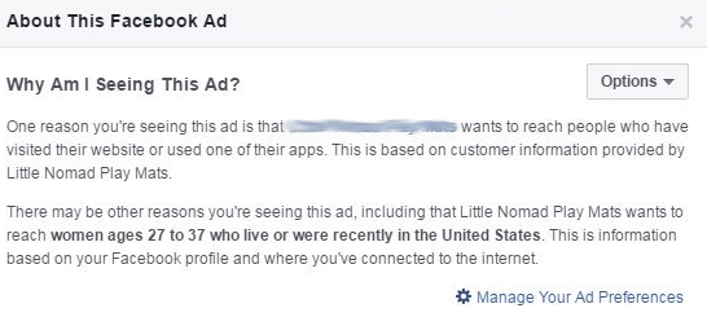 This situation is common. Through a partnership with the "Who Targets Me" projection, nosotros had the opportunity to admission a database of targeted advertisements Facebook. Although the focus of the projection is on political campaigns, the browser extension they developed collects all types of ads published for about 7,000 people who installed the tool, primarily in the United kingdom. By searching the database to find ads for infant products, we hoped to determine whether they were targeted primarily at women.
This situation is common. Through a partnership with the "Who Targets Me" projection, nosotros had the opportunity to admission a database of targeted advertisements Facebook. Although the focus of the projection is on political campaigns, the browser extension they developed collects all types of ads published for about 7,000 people who installed the tool, primarily in the United kingdom. By searching the database to find ads for infant products, we hoped to determine whether they were targeted primarily at women.
Baby-clothing advertisements:

Advertisements from stores selling all types of baby products and gears:

Babe care advertisements:
 Nosotros likewise searched for ads containing the word "fertility" and the results were similar. In both cases, the database confirmed that these ads were viewed more ofttimes by women, suggesting that advertisers on Facebook more than often chose to target women with these ads. We did not discover any ads in the database about babies or fertility targeting just men.
Nosotros likewise searched for ads containing the word "fertility" and the results were similar. In both cases, the database confirmed that these ads were viewed more ofttimes by women, suggesting that advertisers on Facebook more than often chose to target women with these ads. We did not discover any ads in the database about babies or fertility targeting just men.
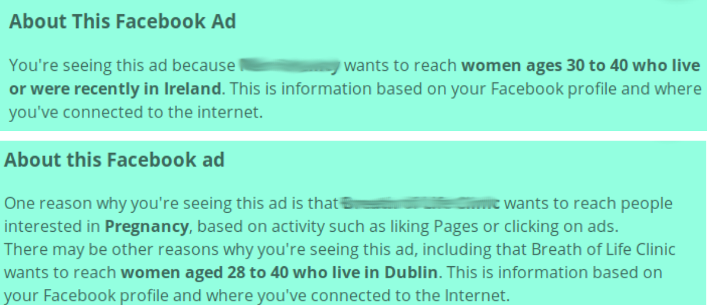
"I changed my gender on Facebook (for family just) to escape the infant/sperm donor ads", tweeted another adult female. That comes every bit no surprise: even if we take moved past what should be considered ancient sexist ads, like the ads beneath that suggest women's piece of work is limited to household activities:
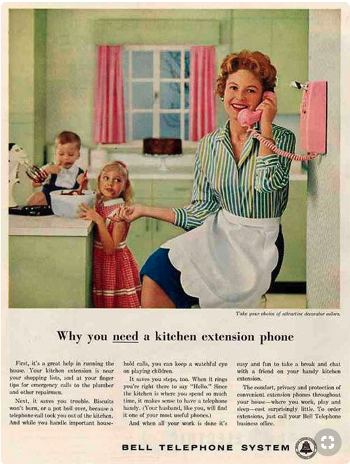
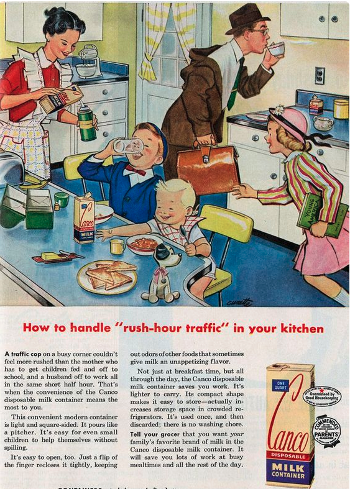 Sources: Envisioning the American Dream and Mad Men Art
Sources: Envisioning the American Dream and Mad Men Art
... And that some might remember that advert like these have get a piffling flake more gender-neutral:
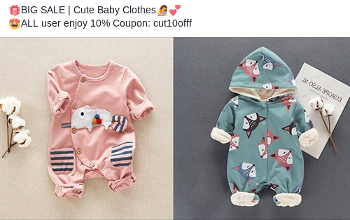
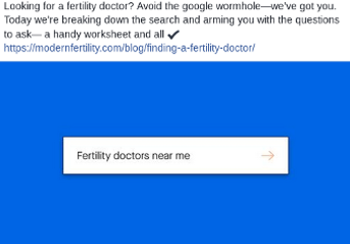
The truth is, if these ads but target women, at that place isn't much difference from the past, as they are reinforcing gender roles that have been questioned by the several feminisms. Gender-based advertising or ads that reinforce gender stereotypes are not a recent problem. For decades, patriarchal notions that extend to the market have objectified the adult female's body, associating certain appearances with notions of dazzler or sexuality, in many cases prescribing what physical or psychological wellness and illness look like. But when this happens under the guise of neutrality or objectivity, gender stereotypes and sexism become even more than dangerous, subconscious in the obscure logic of the algorithm.
Sometimes, similarities with the past are even more striking. A woman reported to u.s. how outraged she was by the tone of the handbag ad beneath.
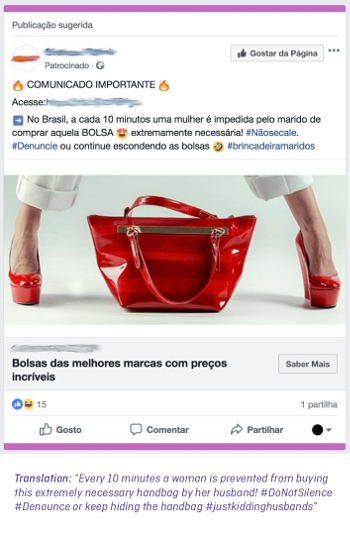
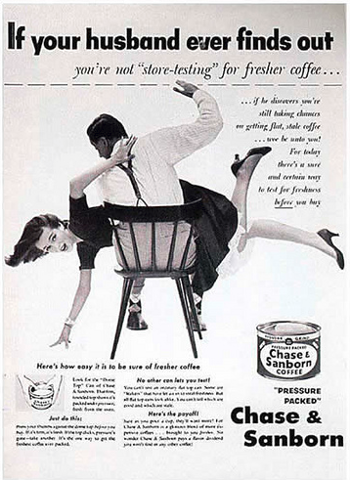 Source: Chase&Sanborn Ad
Source: Chase&Sanborn Ad
"This advertising is based on the supposition that the husband must authorize the purchase, that women take no autonomy over their expenses and jokes about campaigns to written report violence confronting women. This is an extremely offensive advertisement", she says. "I am part of a number of support groups for women in abusive relationships, this [ad] could even indicate that I am experiencing abuse. [Were I] in such a situation, viewing that kind of ad would trigger an even worse feeling than the 1 that I already felt," she adds. It is indeed really sad to notation that contemporary ads still employ sexist jokes that underestimate gender based violence. This 1 really took united states of america back to the 1950s, where people thought it was fun and ethical to portray violence against women to sell java.
Stories of discomfort are frequent. "Beloved @facebook: the only fourth dimension I've e'er been significant I miscarried. Thanks for the stream of ads for new moms & women who hate their bodies," tweeted Rachael, whom nosotros after interviewed. As a dietitian who works with people who have eating disorders, she is attuned to the ways in which these messages can be harmful. "I experience particularly concerned virtually how these type of ads bear upon those prone to eating disorders & disordered eating," says Rachael. She typically blocks those advertisers who are deliberately playing on women's insecurity and self-hate, or who engage in body shaming.
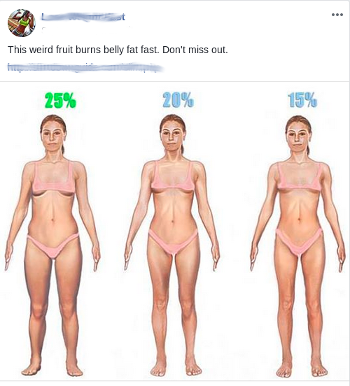
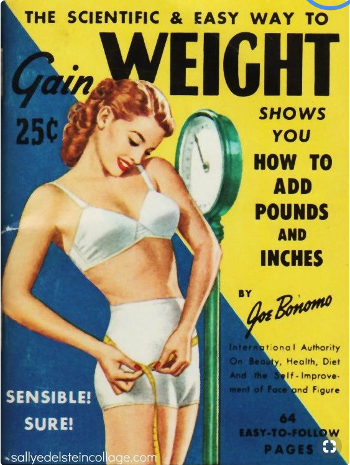 Source: Envisioning the American Dream
Source: Envisioning the American Dream
Any similarity among these ads is non incidental, fourth dimension has passed, standards have changed from "gain weight" to "lose weight", just the message "be ashamed of your body", "buy this to alter that", remains the same.
There are besides multiple reports of women who seem to be targeted on Facebook for depression or feet. "Facebook shows me mostly ads about sadness," tweeted Charlene. When nosotros interviewed her, she said that the ads she well-nigh often sees are "those horrendous 'counselling' ones with the crying girl." A number of women confirmed that they are shown ads with pictures of distressing, weeping women.

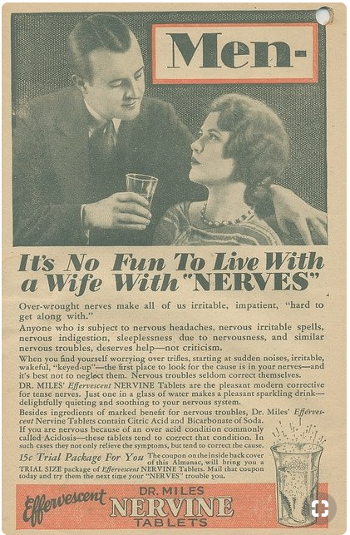 Fonte: Nervine advertisement
Fonte: Nervine advertisement
What has changed are the tools that are being used to reinforce misleading and even dangerous narratives effectually gender, bodies, sexuality, and motherhood. These sexist advertisements were scattered in magazines and newspapers in past decades. Today they are disseminated through algorithms that the advertisers themselves might not understand.
mewton-woodbeforavy.blogspot.com
Source: https://chupadados.codingrights.org/en/gendered-targeted-ads/
0 Response to "Target Is Sending Me Baby Ads but Im Not Pregnant"
Post a Comment